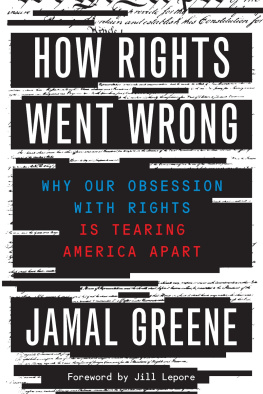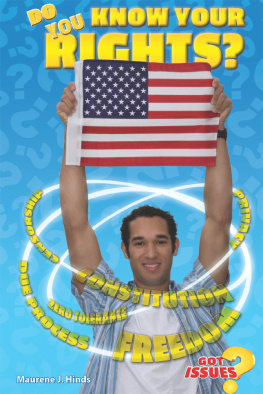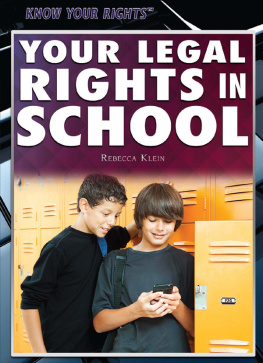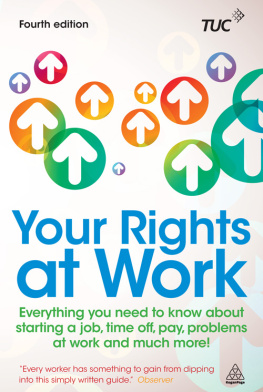Copyright 2021 by Jamal Greene
All rights reserved
For information about permission to reproduce selections from this book, write to or to Permissions, Houghton Mifflin Harcourt Publishing Company, 3 Park Avenue, 19th Floor, New York, New York 10016.
hmhbooks.com
Library of Congress Cataloging-in-Publication Data
Names: Greene, Jamal, author.
Title: How rights went wrong : why our obsession with rights is tearing America apart / Jamal Greene.
Description: Boston : Houghton Mifflin Harcourt, 2021. | Includes bibliographical references and index.
Identifiers: LCCN 2020034165 (print) | LCCN 2020034166 (ebook) | ISBN 9781328518118 (hardcover) | ISBN 9780358450245 |
ISBN 9780358450443 | ISBN 9781328518149 (ebook)
Subjects: LCSH: Civil rightsUnited States. | United States. Constitution. 1st10th Amendments. | Affirmative action programsUnited States. | DiscriminationLaw and legislationUnited States.
Classification: LCC KF4749 .G74 2021 (print) | LCC KF4749 (ebook) | DDC 342.7308/5dc23
LC record available at https://lccn.loc.gov/2020034165
LC ebook record available at https://lccn.loc.gov/2020034166
Jacket design by Brian Moore
Jacket image: Jack R Perry Photography/Shutterstock
Author photograph Jason Berger 2020
v1.0221
For Mom and Dad
Foreword
The problem of the twenty-first century, Jamal Greene argues, echoing W.E.B. DuBois, is the problem of the rights line. Rights talk has become the driving force of American political discourse, a chief source of the contortion of American courts, and an engine of American political polarization. Rights wars are battles of all against all, absolute and unrelenting. It is the argument of this important book that until Americans can reimagine rights, there is no path forward, and there is, especially, no way to get race right. No peace, no justice.
Claiming that your rights have been violated has become the best and in many cases the only way to pursue your political interest. Instead of seeking political change in pursuit of my interest in the realm of political debate and the making of lawwhere my interest will compete with your interest, and we will likely arrive at a compromisemy remedy is to claim that my interest is not an interest but a right. You do that, too. And then we go to court. As a result, conflicts that dont need to be settled in the courts are settled in the courts, where the winner takes all. In a contest between your rights and my rights, the courts decide whose rights win based on each judges preferences. This is neither fair nor democratic. And, as Greene writes searingly, it divides us into those who have rights and those who dont.
Greene is not the first legal scholar to point out that rights claims have run amok. In 1991, in Rights Talk: The Impoverishment of Political Discourse, Mary Ann Glendon argued that discourse about rights has become the principal language that we use in public to discuss weighty questions of right and wrong, but time and again it proves inadequate, or leads to a standoff of one right against another. Under this regime, Glendon argued, a tendency to frame nearly every social controversy in terms of a clash of rights (a womans right to her own body vs. a fetuss right to life) impedes compromise, mutual understanding and the discovery of common ground. Glendon saw the much-vaunted rights revolution as having begun in the 1960s. But, as Greene argues here, it has a much longer and more complicated history, calling for different solutions. It is one of the hallmarks of Greenes work that he looks to other countries for those solutions, finding, in their different rights discourses, a world of possibilities. And he looks, as well, to the past.
Like Glendon, Greene finds the origins of the hardening of rights discourse in the 1960s. But he begins his inquiry in the eighteenth century, because hes particularly keen to figure out exactly when and how and why things went awry. American courts draw firm lines, often in morally arbitrary ways, between the interests they consider rights and those they dont, Greene writes. The interests that courts count, they protect robustly from democratic politics, while those that they dont count remain wholly at the governments mercy. We sometimes describe this fetishism about rightsbut just some rightsas foreordained by the Founding Fathers, but America wasnt born this way. It was only born this way in this sense: to be a human being held as property is to be a person without any rights. Dividing people into those with rights and those without began at the beginning.
Read this book to find out what Greene means about how rights went wrong and what he proposes, and then decide whether you agree. But I suggest keeping your eye on the ball, which is racial injustice. The oldest national organization in the United States founded to pursue constitutional rights is the National Association for the Advancement of Colored People, which began in 1909. Six years later, the NAACP concluded that the Supreme Court has virtually declared that the colored man has no rights. The NAACP embarked on a strategy to seek fundamental rights, as guaranteed under the Fourteenth and Fifteenth Amendments. Led by this organization, the Progressive movement marked a turning point in the history of rights seeking by way of lawsuits, down through Brown v. Board of Education in 1954 and the criminal justice cases addressed by the Warren Court in the 1960s. Rights asserted by way of a remedy to rights for so long and so violently denied did not end the battle of rights but instead turned it into a war when, beginning in the 1970s, modern conservatives, adopting methods used by liberals, asserted not liberal claims to rights, but conservative claims to rights. Rights fights became politics by other means.
How Rights Went Wrong is an essential and fresh and vital history of constitutional law and American politics. It is also a cautionary tale, with a sober warning for judges and lawyers. Courts should be reminding litigants of what they have in common, not encouraging them to view their opponents in the worst conceivable light, Greene writes. How Rights Went Wrong is an argument against judicial supremacy, in the interest of justice.
The courts in plenty of other countries avoid this mess. One of the most valuable contributions of this book is its comparative approach, looking especially at the resolution of rights conflicts in Germany and the United Kingdom as models of rights mediation. Those courts arent perfect, and Greene doesnt pretend that they are. But he wants to shake Americans loose from the fiction that the courts own the Constitution. It is, instead, ours.
Jill Lepore
Introduction
You have the right to remain silent, and the right to free speech. The right to go out, and the right to stay home. The right to worship, and the right to doubt. The right against racial or sex discrimination, and the right to hate. The right to marry and to have children. The right to divorce and to terminate a pregnancy. The right not to be tortured. The right to die. The right to vote, and the right not to. The right to education, and the right to homeschooling. The right to health, and to refuse health insurance. The right to eat, and to stop eating. The right to clean air and water. The right to smoke cigarettes. The right to buy what you need. The right to hoard. The right to work. The right to party.
A performance artist named Karen Finley, best known for smearing chocolate over her naked body, claimed a right to National Endowment for the Arts funding. She lost. A conservative advocacy group called Citizens United claimed the right to use its corporate treasury funds to produce an antiHillary Clinton movie during her first presidential run. They won. Two Orthodox Jewish merchants in Philadelphia claimed the right to keep their stores open on Sundays. They lost. Jack Phillips, a Colorado baker, claimed the right to refuse to make a cake for a same-sex wedding. He won. Two Missouri women, Ndioba Niang and Tameka Stigers, claimed the right to braid hair without completing a 1,500-hour training course and obtaining a cosmetology license. They lost. A group of neo-Nazis claimed the right to unite, armed with racist propaganda and semiautomatic rifles, in a public park in Charlottesville, Virginia. They won. A Louisiana man named Gregory Sibley claimed the right to food, clothing, and shelter. He lost. A Long Island man, James Maloney, claimed the right to use his homemade nunchucks to teach the Shafan Ha Lavan karate style, which he made up, to his children. He won.








